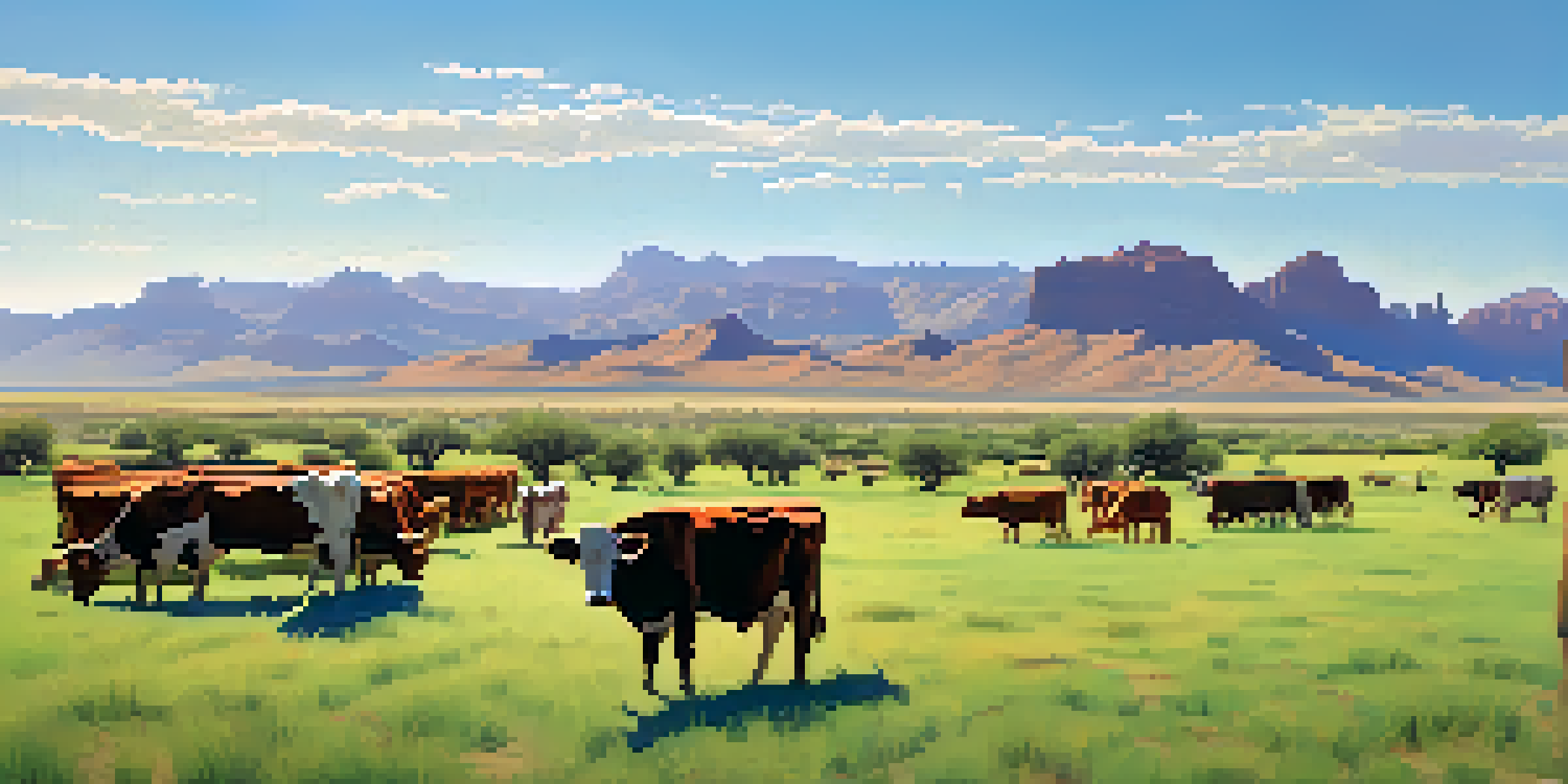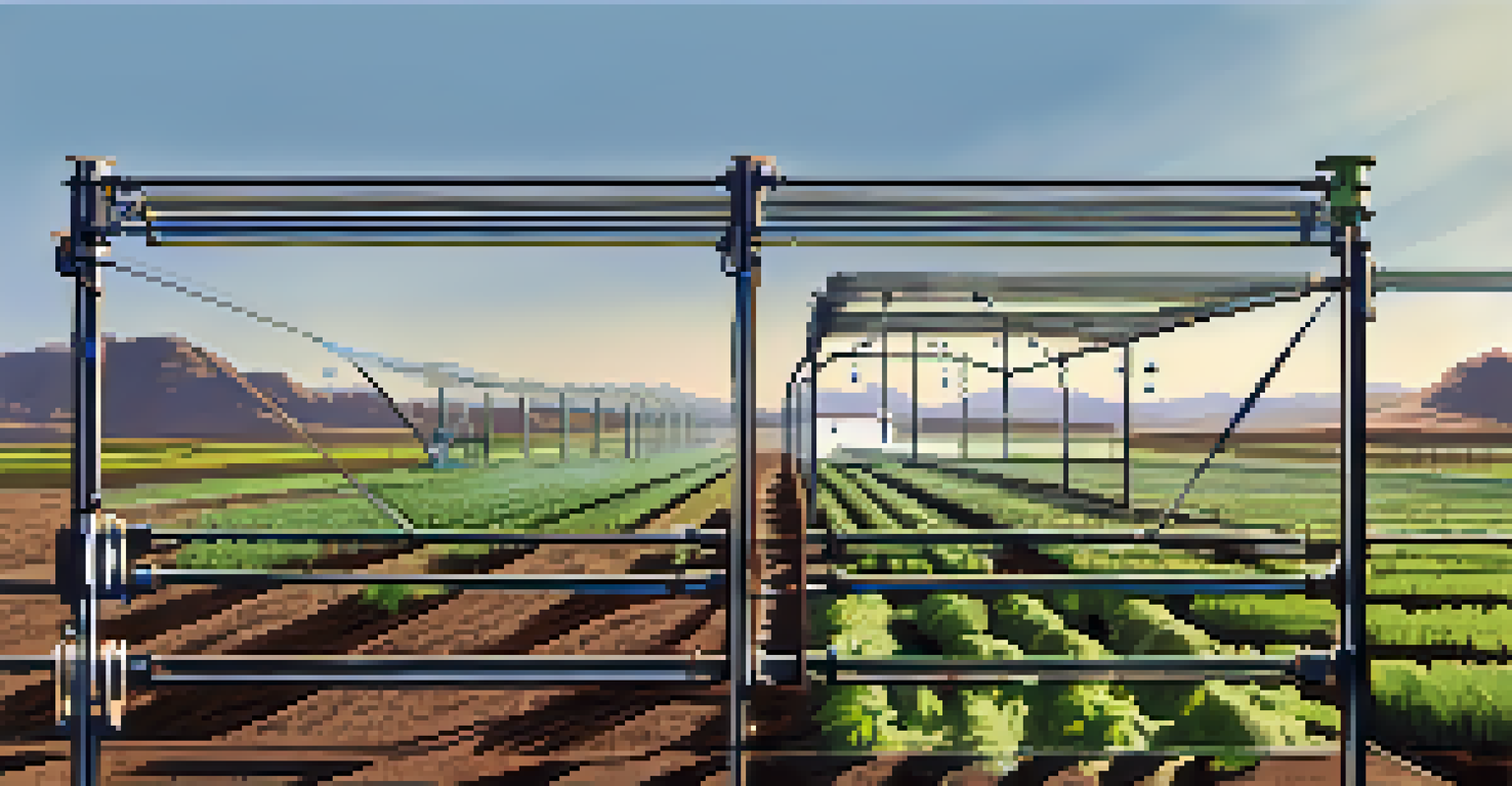The Future of Livestock Farming in Arizona's Climate

Understanding Arizona's Unique Climate Challenges
Arizona is known for its arid climate, characterized by high temperatures and minimal rainfall. These conditions create unique challenges for livestock farmers who must ensure their animals thrive despite the heat. For instance, heat stress can significantly affect livestock health, leading to decreased productivity and increased mortality rates.
The greatest threat to our planet is the belief that someone else will save it.
Moreover, water scarcity is a pressing issue in Arizona, with many regions facing severe droughts. Farmers need to implement water-saving strategies, such as efficient irrigation systems and rainwater harvesting, to sustain their operations. By addressing these challenges head-on, livestock farmers can adapt to the changing environmental landscape.
As climate change continues to alter weather patterns, it's crucial for farmers to stay informed about potential impacts. By understanding these challenges and preparing for them, livestock farmers can secure a more sustainable future in Arizona.
Innovative Farming Techniques for Sustainability
To combat the challenges posed by Arizona's climate, innovative farming techniques are essential. One promising approach is the use of rotational grazing, where livestock are moved between pastures to prevent overgrazing and allow grasslands to recover. This method not only improves soil health but also enhances animal welfare.

Additionally, integrating technology into livestock farming can lead to better resource management. For example, sensors can monitor animal health and environmental conditions, allowing farmers to make data-driven decisions. This kind of precision farming helps optimize feed and water usage, crucial in a resource-limited environment.
Adapting to Water Scarcity
Farmers in Arizona must implement effective water management strategies, such as drip irrigation and rainwater harvesting, to combat ongoing water scarcity.
Finally, embracing alternative feed sources, like drought-resistant plants or by-products from other industries, can reduce dependence on traditional feed and improve sustainability. These innovations will play a key role in shaping the future of livestock farming in Arizona.
The Role of Genetics in Livestock Resilience
Genetics plays a vital role in developing livestock that can withstand the harsh conditions of Arizona's climate. By selecting breeds that are naturally more heat-tolerant or drought-resistant, farmers can enhance their herd's resilience. For example, certain cattle breeds are better suited for arid environments, requiring less water and feed.
Sustainability is not a destination, but a journey.
Moreover, advancements in biotechnology allow for genetic improvements that can lead to more robust livestock. Techniques like selective breeding and genetic engineering can help produce animals with traits that enhance survival and productivity in challenging climates. This science can be a game-changer for Arizona's livestock farmers.
By focusing on genetics, farmers can not only improve their productivity but also contribute to the overall sustainability of their operations. A resilient herd is better equipped to face the uncertainties of climate change, ensuring long-term success.
Water Management Strategies for Livestock Farming
Effective water management is crucial for livestock farming in Arizona, where water scarcity is a significant concern. Farmers can adopt various strategies, such as implementing drip irrigation systems that minimize water waste while providing sufficient hydration. This approach not only conserves water but also promotes plant health, benefiting the livestock that rely on forage.
Another strategy is the use of water-efficient livestock breeds that require less water for maintenance. By choosing breeds that are adapted to arid climates, farmers can reduce their water usage while still maintaining healthy animals. This not only helps in managing resources but also aligns with sustainability goals.
Innovative Techniques for Sustainability
Embracing innovative farming practices like rotational grazing and technology integration can enhance livestock health and resource management in Arizona's challenging climate.
Finally, creating water catchment systems can help farmers make the most of rainfall when it does occur. By harvesting rainwater, livestock operations can build resilience against drought and ensure a more stable water supply throughout the year.
The Importance of Soil Health in Livestock Farming
Soil health is a fundamental aspect of sustainable livestock farming, especially in Arizona's challenging climate. Healthy soil not only supports the growth of nutritious forage but also plays a crucial role in water retention, which is essential in arid regions. Farmers can utilize practices like cover cropping and reduced tillage to enhance soil health.
Moreover, healthy soil promotes a diverse ecosystem that can help manage pests and diseases naturally, reducing the need for chemical interventions. By fostering a balanced ecosystem, farmers can create a more sustainable environment for their livestock to thrive.
Investing in soil health also has long-term benefits, as it leads to improved crop yields and livestock productivity. For Arizona's farmers, prioritizing soil health is a key strategy for ensuring the sustainability and profitability of their operations.
Community Engagement and Support for Farmers
Community engagement plays an essential role in the future of livestock farming in Arizona. By collaborating with local organizations, farmers can access valuable resources and support systems that help them navigate climate challenges. These partnerships can foster knowledge sharing and best practices among farmers facing similar issues.
Additionally, community support can enhance advocacy efforts for sustainable farming practices. By working together, farmers can influence policies that promote conservation and resource management, ensuring a more favorable environment for livestock farming in Arizona.
Genetics for Resilient Livestock
Selecting heat-tolerant and drought-resistant livestock breeds is crucial for enhancing resilience and ensuring productivity in Arizona's harsh environmental conditions.
Ultimately, a strong sense of community can empower farmers to adapt to changing conditions and innovate for the future. Together, they can build a more resilient agricultural landscape in Arizona.
The Economic Outlook for Arizona's Livestock Industry
The economic outlook for Arizona's livestock industry is closely tied to how well farmers adapt to the changing climate. As demand for sustainably raised meat and dairy products continues to grow, farmers who implement innovative practices stand to benefit financially. This shift can attract consumers who prioritize environmental responsibility in their food choices.
Furthermore, investments in technology and infrastructure can lead to increased efficiency, reducing operating costs for farmers. As they adopt more sustainable practices, they may also qualify for grants and incentives aimed at promoting environmentally friendly farming.

In conclusion, the economic future of Arizona's livestock farming heavily depends on adaptability and sustainability. By embracing new practices and technologies, farmers can secure their livelihoods while contributing to a healthier planet.